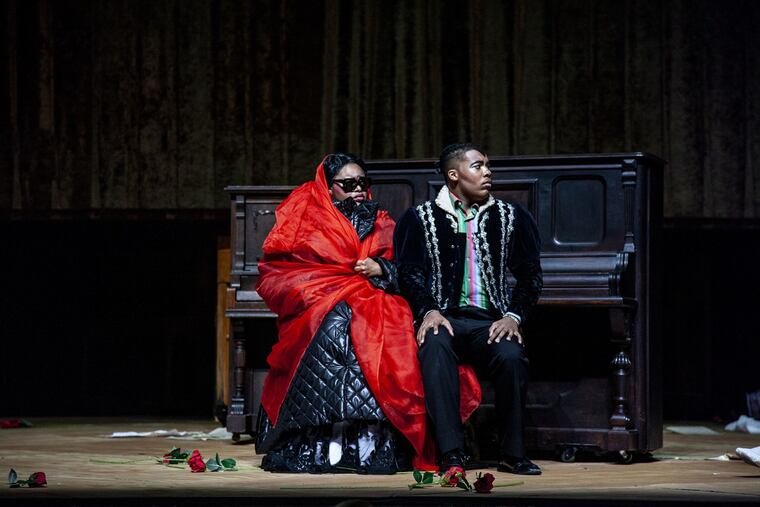Curtis Institute’s ‘Don Giovanni’ showcases rising stars — and vivid work by Karina Canellakis — but what’s with all those pianos?
Keep your eye on up-and-comers like Tiffany Townsend and Dennis Chmelensky. And see how a young company grapples with one of opera's storied womanizers.

There’s quite a bit good and a good deal great about the Curtis Institute of Music’s Don Giovanni, continuing this weekend in the Perelman Theater. So much so that when confronted with the silliness factor, it’s probably best just to close your eyes.
That way, it will be easier to focus on the sophisticated pacing and individualized textures conductor Karina Canellakis gets from her highly polished instrumentalists in a Mozart score as much about the orchestra as anything else.
It also will be easier to take in the glories of two singers in particular in this rotating cast. Thursday night’s opening featured baritone Dennis Chmelensky in the title role and soprano Tiffany Townsend as Donna Anna, and for their carrying power as well as subtle sensitivity to sound, these two singers seem primed for busy careers.
The entire cast, in fact, is a fine one: bass Adam Kiss was Leporello the night I was there, bringing vivid humor and fear into his voice. Soprano Lindsey Reynolds was well on her way to accessing the kind of easy virtuosity that makes for a good Zerlina.
It was hard to escape the feeling, though, that the musical forces in this production — copresented by Opera Philadelphia and the Kimmel — had been led down the garden path by the visual ones.
Enigmatically, the stage is populated by a dozen or so upright pianos. In some sense, they stand in as gravestones, and the singers spend a great deal of the production rolling them from place to place, as though trying to turn aside the inevitability of fate.
But before fate, sex. “He who remains true to one woman is being cruel to the others,” sings Don Giovanni at one point, and here of course is what this opera is all about.
The womanizer recurs in all ages, stage director and costume designer R.B. Schlather seems to be telling us by unmooring the production from a particular time period. Characters are as likely to be garbed in 18th-century dress as a pair of Y-3 track pants.
How to deal with a creature like Don Giovanni post-#MeToo is a challenge. In fact, you had to believe this audience wasn’t sure how to feel, either. They offered a curiously muted response during bows to Chmelensky, who was not just the title character but also the most mature and nuanced singer in the cast.
One way into the question of how to handle an infamous womanizer is to put his fate in the hands of a woman — say, a woman director. But to be clear, the reason to have Canellakis in the pit was a purely musical one, and it was a choice that paid dividends.
There are transitional spots and questions about the character of the music in this score that puzzle other conductors. Canellakis made the orchestra an equal partner throughout by evoking the buoyant charms of a wind serenade or arrival moments of nobility.
Yes, many of the tempos were quicker than those we might be used to hearing in this opera. But she offered good reasons.
In that last scene where the Commendatore comes back, the rising and descending gestures in the orchestra have always packed a built-in tension. Here, though, at her faster tempo, they were as the wind, and it was tempting to hear them as whipping Don Giovanni with payback.
OPERA REVIEW
Curtis Opera Theatre’s “Don Giovanni”
Additional performances: 7:30 p.m. Friday and Saturday and 2:30 p.m. Sunday at the Kimmel Center’s Perelman Theater, Broad and Spruce Streets. Tickets: $20-$100. Information: 215-732-8400, operaphila.org.